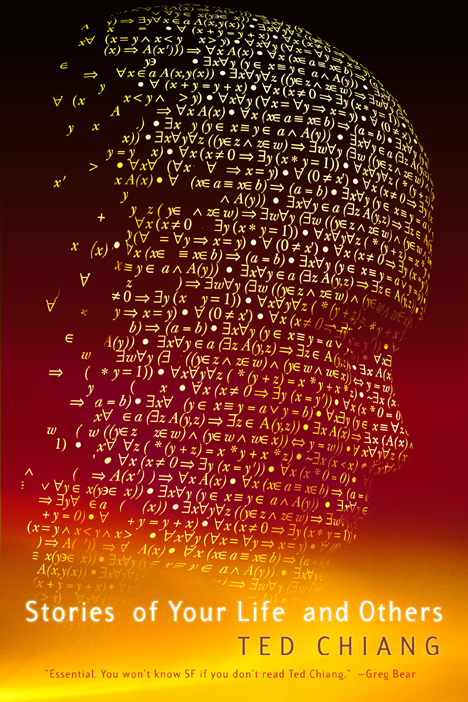
This new edition of Ted Chiang's masterful first collection, Stories of Your Life and Others, includes his first eight published
stories plus the author's story notes and a cover that the author commissioned himself. Combining the precision and scientific
curiosity of Kim Stanley Robinson with Lorrie Moore's cool, clear love of language and narrative intricacy, this award-winning
collection offers readers the dual delights of the very, very strange and the heartbreakingly familiar.
Stories of Your Life and Others presents characters who must confront sudden change—the inevitable rise of automatons or the
appearance of aliens—while striving to maintain some sense of normalcy. In the amazing and much-lauded title story, a grieving
mother copes with divorce and the death of her daughter by drawing on her knowledge of alien languages and non-linear memory
recollection. A clever pastiche of news reports and interviews chronicles a college's initiative to "turn off" the human ability
to recognize beauty in "Liking What You See: A Documentary." With sharp intelligence and humor, Chiang examines what it means to
be alive in a world marked by uncertainty and constant change, and also by beauty and wonder.
Quotes and thoughts while reading:
Tower of Babylon: This was a really good way to start. A wonderful created world, drawing from historical and
biblical imagery. The idea of a world where the horizon really is the edge of the world, an environment where the sky
is the limit, with a solid granite roof above was wonderful to entertain, and just foreign enough to instill a sense
of intrigue at every page turn. The final physical, geometric shape of the world was postulated to be one of the possible
geometric dimensions of the universe, so I found that to be very intriguing.
Understand: If you've seen Limitless, a 2011 film, the the basic gist of Understand is familiar. But the
ending is much much better. "I am a lover of beauty, he of humanity... He considers intelligence to be a means, while
I view it as an end in itself." (p. 64-65) It reads very quickly, because the pacing is done so well, and the story
very engaging.
Division by Zero: How shocked would the world be, if there was a rigorous proof, that 1 = 2? It's kind of
a question we played around with in math. If you start with 1 = 2, you can prove anything. Because your assumption
is false. But what if all your assumptions are valid, all your steps cogent, and at the end you get that 1 = 2? And
how would it feel, to be the person who shattered the very realm of mathematics? These are the questions that Division
by Zero tackles.
Story of Your Life: Hmmm, non-linear and fascinating. The language built around the alien species, with their
logograms, hepta-centric bodies (eyes, legs) and dissimilar simplicity of mathematics was fun to read. I'm curious
what our narrator said in the end to them. I still can't say I fully understand the statement "locus exchange-transaction
converse inclusive-we". Was that the trigger for them to leave? How was it communicated beforehand? Why was our narrative
so keen on them leaving. I missed it, yes, but I'll have the book around to read again. The inclusion of Fermat's principle
of least time was really neat. The topic of variational principles is fascinating.
Seventy-Two Letters: Another story reminiscent of a movie, this time Pi. Numerology and the Torah have always interested
me, so this was especially fun. I remember reading these Merlin books as a kid, and knowing the true name of something gave you
a certain power over it. This is true here as well. A little dry at times, but very interesting.
Hell is the Absence of God: I wasn't really into this one. For no real reason, other than the religious aspect
is one I immediately put up walls to. Again, the world building is great, the angel imagery was interesting, but it just
didn't hook me like the other stories in the collection.
Liking What You See: A Documentary: Calliagnosia seemingly eliminates the preconceived notions of beauty that
are reinforced in a media driven society. I think the ethical discussions were interesting, but I especially thought the
discussions based around how media effects our thinking were enlightening. Talking about the super-enhanced beauties, and
how Tamara (the young woman who got her calli turned off) was just entranced by their appearance. I don't know where I would stand
on the debate. There is a part of me that thinks it is very important to work on your bias, and to address it and grow through that
process. But then there is another part of me that knows most people won't do this work, because it is hard. So, do we just make
the choice for them? Because they are realistically the people who need it the most? Or does that simply throw us into a totalitarian
state, where no one has a choice?
© JKloor 2015 Books
